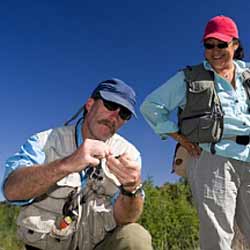Fishing Guide Jobs
People love to fish. All over the country people are fishing. Right now someone is out on the river floating their line in the current, waiting for a big rainbow trout to bite. Fishing is a peaceful experience that gets you out into the peaceful natural world and away from the sounds of traffic and the busy work of writing memos.

Imagine if you could just go fishing everyday. Well, you can. That’s the life of a fishing guide. Fishing guides make their living by fishing for fun. It may come as a shock to you, but the fishing industry is a huge money making machine. It is one of America’s favorite past times and people are more than happy to travel the country and even the world to fish in different locations and for different fish.
There are many types of fishing. You can go fly fishing in the rivers of Colorado, deep-sea fishing off the coast of North Carolina, bass fishing in Texas, or charter boat fishing in Alaska. Everywhere there are fish; there are also people that want to fish for that fish. This is where you come in, as their fishing guide.
Fishing guides really live the life. They get to live almost anywhere they want and fish outdoors everyday. Usually they work for a hunting or fishing outfitter, but once they are established, they can work freelance – only fishing with their most loyal clients and friends. The job of a fishing guide is to be an expert on the fish, the waters, and the style of fishing that they guide. You’re area of expertise may be fly fisherman who fishes for salmon in the wilds of Chile’s Patagonia or a deep sea fisherman searching for blue fin tuna off the coast of Bermuda. Other safety, water, or boating skills will also help your chances of finding a job.
In order to work as a fishing guide, you need to be able to do more than just fish. You need to have people skills. You need to be able to put a smile on your face at all times and cheerfully deal with clients. From daybreak to sun down, you are with clients that admire you as a professional fisherman and they want to learn what you know. It may be tips about technique, the surrounding environment, or any other chitchat that may come up. To be successful as a fishing guide, your people skills must be on par with your fishing.
If you want to get hired as a fishing guide, apply at different outfitters in your area. It’s easier to get a job where you know the waters and the fish, than to try to work in a place you’ve never been. Try talking to both hunting and fishing outfitters, as they are your best bet for employment. It’s common for guides to charge up to $500 for full-day river floats and ocean charter trips. Costs vary by location and the type of fishing. Working for someone else a guide might earn an hourly wage plus tips.
